Hearts and Minds
When Tyler Moon ’16 suffered cardiac arrest during a 10-mile race, a cascade of connections saved his life—including one with Dr. Michael Ackerman ’88.
Around 8 a.m. on October 6, 2019, Tyler Moon took two unnaturally large gasps for air and collapsed face-first onto the pavement. Cardiac arrest, out of nowhere, at age 25. He was at the eight-mile mark of the Medtronic Twin Cities 10-Mile, a race that begins outside U.S. Bank Stadium in Minneapolis and stretches through tree-lined boulevards, including Summit Avenue in St. Paul, where Tyler fell. On the ground, motionless and bloodied, his heart entered “sudden death exit rhythm,” and the final seconds of his life began to tick.
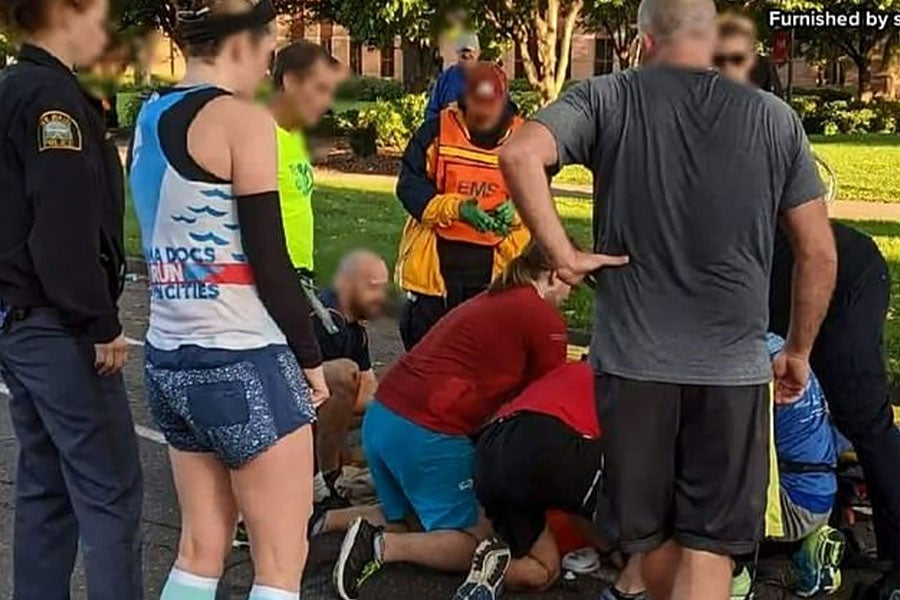
Good Samaritans jumped in to help when Tyler Moon '16 collapsed during a 10-mile race in 2017.
What happened next has been described as a stunning display of the human spirit. Runners in Tyler’s proximity—some of them medical professionals, none of them knowing Tyler—sprang into action. Within seconds, those first responders recognized the severity of what had happened. They called 911, began administering CPR, and took turns as needed to keep his blood pumping through his body. Less than 15 minutes later, an automatic external defibrillator shocked Tyler’s heart back into rhythm. He was rushed to Regions Hospital, then later transferred to Mayo Clinic in Rochester.
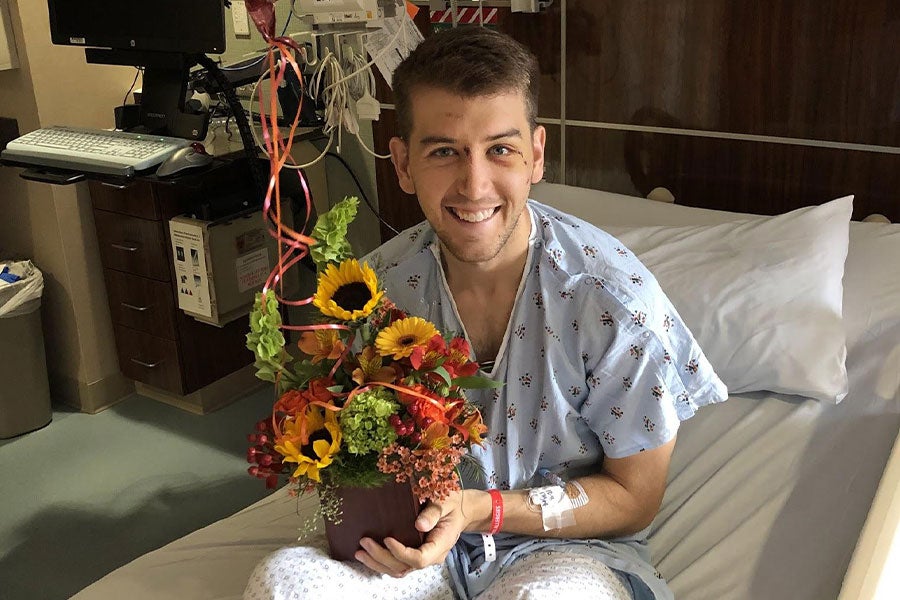
Soon after his collapse, Tyler recovered at Mayo Clinic in Rochester, Minn.
Soon, special details began surfacing, like a Polaroid slowly coming into focus. A reporter covering Tyler’s story discovered that one of the runners who gave CPR, Jesse Bueno, had the given name Jesus—a detail with poetic resonance for Tyler, who had changed his running bib to read “Jesus Saves.” There was also the miraculous fact that, of the 11,050 runners that day, Tyler collapsed in front of people who knew exactly how to help. And then there was the doctor who would oversee his recovery: a fellow Luther grad with ties to Tyler’s family.
To Tyler, who has a strong Christian faith, it all added up to more than coincidence. It was divine intervention. “As a believer, it’s clear to me God played a hand in my story,” Tyler says. “This stuff just doesn’t make sense from a worldly point of view.”
Six years later, reflecting on the collapse and what followed, Tyler still shakes his head at the mystery and meaning of it all.
Before Mile One
Tyler grew up in a faith-filled Lutheran house in central Minnesota. At Luther, he played football and earned a degree in business administration.
By 2019, three years after graduating, he was engaged to his now-wife Amy, working at General Mills, and putting down roots in the Twin Cities. He’d been inspired by watching Amy’s brother run the Twin Cities Marathon the year before.
“I just fell in love with the whole scene. It was one of the coolest sporting events I have experienced,” Tyler says. “There are literally thousands of people who are pushing themselves physically, mentally, emotionally, spiritually. The bug bit me and after that, I was super interested in running it myself.”
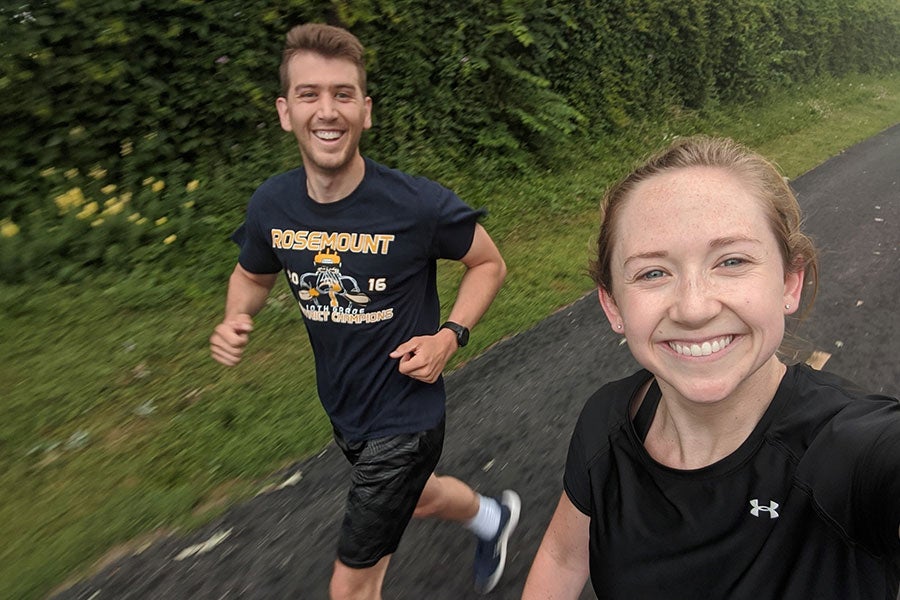
Tyler and his wife, Amy (on rollerblades), training for a marathon in 2020
On race day the following fall, he remembers Amy dropping him off downtown. He remembers the energy of the crowd, the crisp weather, the vibrant autumn leaves. He remembers seeing Amy and other family members at mile one. But after that—nothing. Doctors tell him that his short-term memory loss is owing to either a concussion he sustained when he fell or the medically induced coma medication he was put into upon arrival at the ER.
His awareness would flicker in and out over the next week, up to his transfer to Mayo Clinic, where he would meet the doctor who would guide his recovery.
Sherlock Holmes of the Heart
Dr. Michael Ackerman ’88 met Tyler just days after the cardiac arrest. A principal investigator in the Windland Smith Rice Sudden Death Genomics Laboratory at Mayo Clinic, Mike is internationally recognized for his work on cardiac channelopathies, hypertrophic cardiomyopathy, and postmortem genetic testing. You might call him the Sherlock Holmes of the heart.
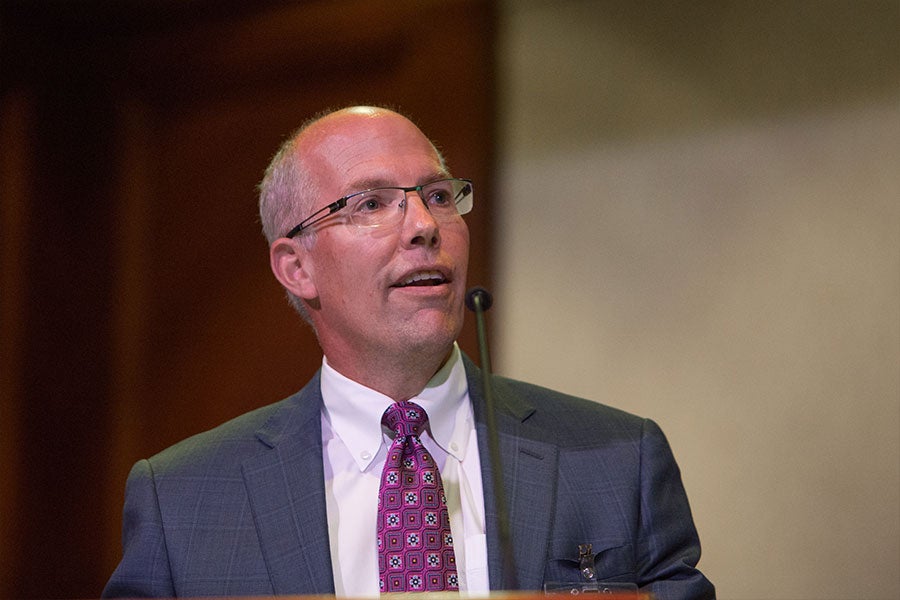
Dr. Michael Ackerman ’88 at a speaking event
It’s unusual for Mike to meet patients so soon after their cardiac events. But Tyler’s family needed answers and a second opinion. The initial care team at Regions Hospital had recommended a defibrillator strategy that didn’t sit quite right with Tyler and Amy.
Tyler’s aunt, a nurse at Mayo, knew Mike and called him directly. He arranged the transfer without hesitation.
“Dr. Ackerman came in early in the morning,” Tyler says. “I don’t have much memory of it because I was still in and out, but Amy told me he just set this amazing tone. Like, ‘You’re here. We’re gonna run tests on you, on your parents. We’re going to try to figure out what happened to you.’ He was the calming presence we needed.”
Over the next few days, their connection deepened. In addition to knowing Tyler’s aunt, Mike had roomed in college with someone from Hayfield, Minn., the hometown of Tyler’s father, Jeff. And, most meaningfully, Mike was a Luther grad too.
“We already really respected him as a doctor,” Tyler says. “But when he told us he was a Luther grad, it was like, Okay, we really like you now. It felt like we turned the corner from a doctor-patient relationship. I’m so grateful for him and his leadership. And to know he walked the same halls [at Luther], there’s just a cool connection there.”
Mike felt it too. “Every family I get the privilege of caring for in these vulnerable situations is special,” he says. “But when you have a great outcome, and the patient is a Luther grad, it makes the moment even sweeter.”
Mike also gave Tyler something invaluable: the confidence to run again. Just 27 days after collapsing, Tyler returned to the course and finished the race he had started.
“I tell people that I have the slowest 10-mile time,” he laughs. “I’m proud of it. I finished, and that was super cool.”
Odds, Outcomes, and the Unknown
Tyler’s tests were inconclusive, which, Mike says, is more common than most people think. When there’s no clear genetic cause or underlying condition, doctors call it idiopathic ventricular fibrillation, or IVF.
“It’s a mystery we still haven’t solved,” Mike says. “You search high and low for clues, and sometimes you just don’t find any.”
Oddly, that ambiguity can be a good sign. “When you don’t have an answer, it almost never happens again—in relatives or future children. So in a way, the best answer is no answer,” Mike says.
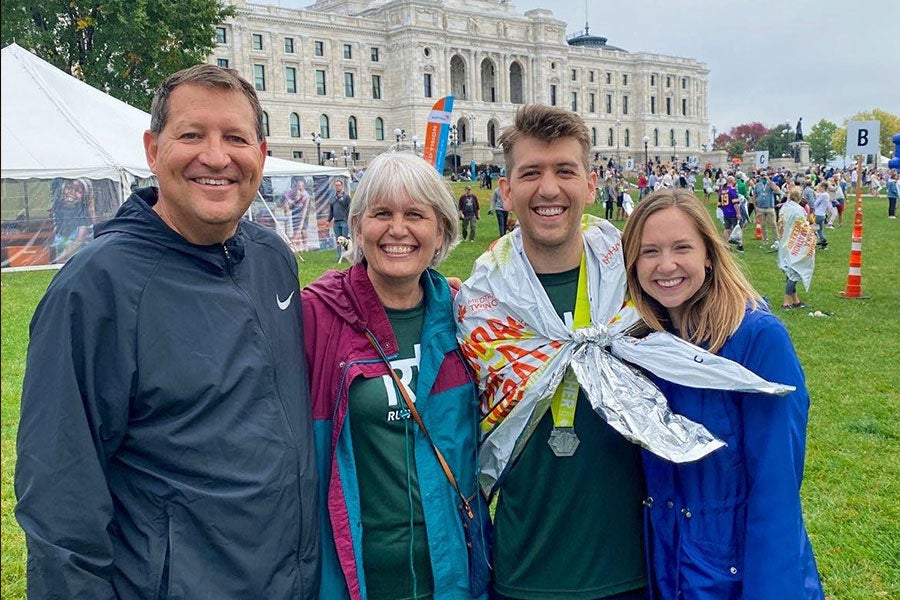
Tyler with his parents and wife following a 10-mile run in 2020
Only 10 percent of people survive out-of-hospital cardiac arrest, and about 50 percent of those survivors experience some degree of brain damage. A lot of things had to go right for Tyler—not just to survive, but to walk away with a complete recovery.
Still, Tyler has an implanted defibrillator—his “shock box”—that acts as an internal paramedic, ready to fire if the same rhythm ever returns. Once a year, he returns to Mayo for a battery of tests to check for emerging clues.
Living Proof
In the wake of his experience, Tyler felt called to share his story. He and Amy launched Moon Family Ministries to speak to faith-based audiences. He also started a secular brand, Living Proof Leadership, through which he speaks to businesses and nonprofits about resilience, growth, and adversity. He’s publishing a devotional book this year based on his experience.
“I tell people how I see the world, how I see death, life, people—it gave me a whole new appreciation,” Tyler says. “I got married three months after the cardiac arrest. I have a son now. To think about him having a son or daughter someday—it’s all such a gift.”

Tyler with his wife Amy and son Robby
Today, you can still find Tyler running—usually with a stroller in front of him and a pair of dad-grade New Balances on his feet. His one-year-old son, Robby, rides along for the journey.
“The feeling of being able to go for a run is kind of indescribable now,” Tyler says. “I often think, I’m conscious. I can’t believe I’m running. This is awesome. It’s an emotional, spiritual time for me.”
Those invisible threads that once lay hidden? Tyler got to see them. And they gave him his life back.
To learn more about Tyler’s work, visit Moon Family Ministries and Living Proof Leadership.
Do you have a meaningful connection with a fellow Luther alum that started through chance?
We’d love to hear your story! Get in touch at magazine@luther.edu.